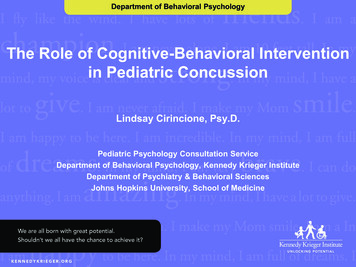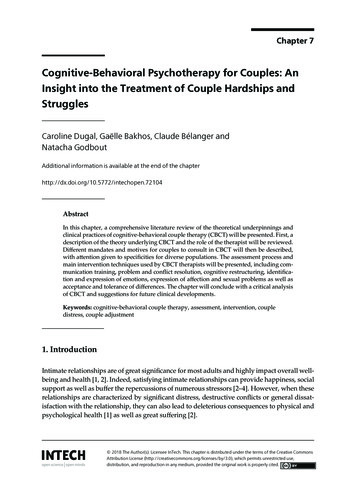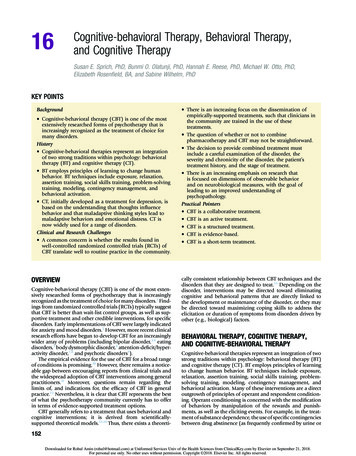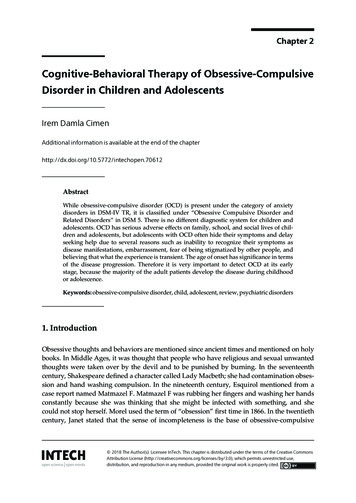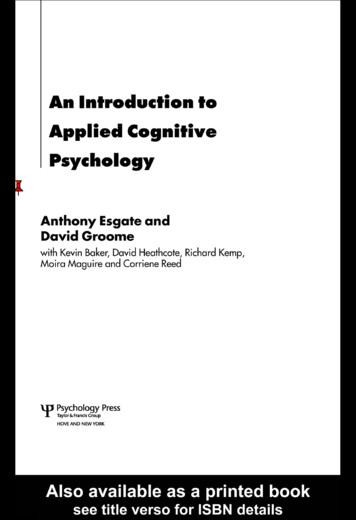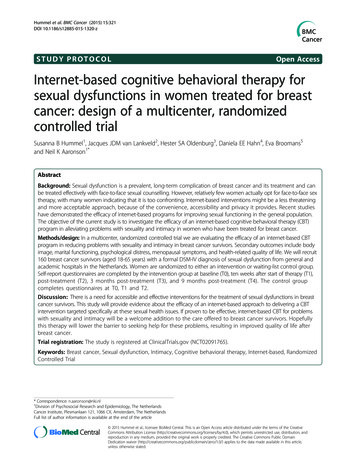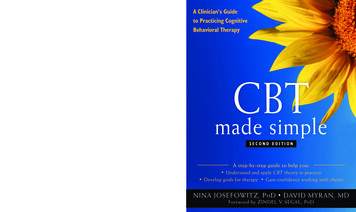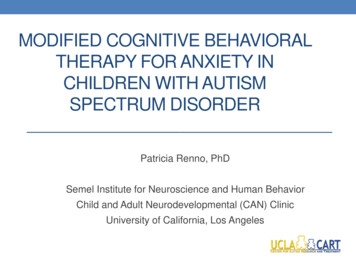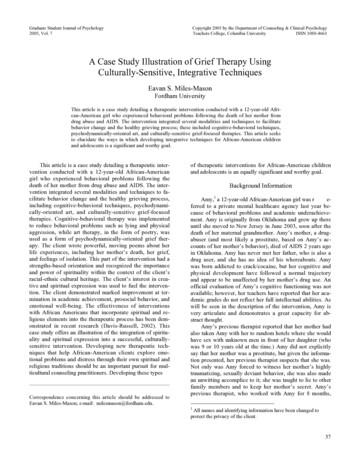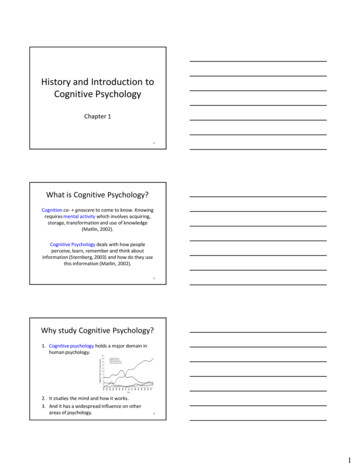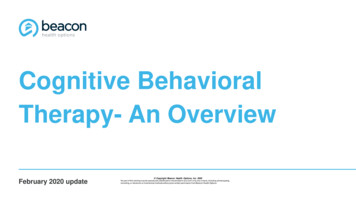
Transcription
Cognitive BehavioralTherapy- An OverviewFebruary 2020 update Copyright Beacon Health Options, Inc. 2020No part of this training may be reproduced,distributedor transmittedany form orby any CopyrightBeaconHealthinOptions,Inc.2020means, including photocopying,recording,or electronicor mechanicalmethodswithoutorpriorwritten rt of thistraining maybe reproduced,distributedtransmittedin any formfromor byBeaconany means,recording, or electronic or mechanical methods without prior written permission from Beacon Health Options.3
Today’s FacilitatorLisa Kugler, PsyD. Master of Counseling Psychology (1999) Doctor of Psychology (2007) Experienced therapist for adults, adolescentsand children in various settings Clinical leadership with Beacon since 2013 Copyright Beacon Health Options, Inc. 2020No part of this training may be reproduced, distributed or transmitted in any form or by any means, including photocopying,recording, or electronic or mechanical methods without prior written permission from Beacon Health Options.4
Learning Objectives:1. Discuss the history of Cognitive Behavioral Therapy (CBT)2. Identify the key principles of CBT3. Recognize common thinking errors4. Describe the basic techniques that are utilized for variousconditions with CBT Copyright Beacon Health Options, Inc. 2020No part of this training may be reproduced, distributed or transmitted in any form or by any means, including photocopying,recording, or electronic or mechanical methods without prior written permission from Beacon Health Options.5
Agenda01What is CBT02History of CBT03How does CBT work04Class Exercises05Looking Ahead06References Copyright Beacon Health Options, Inc. 2020No part of this training may be reproduced, distributed or transmitted in any form or by any means, including photocopying,recording, or electronic or mechanical methods without prior written permission from Beacon Health Options.6
Chapter01What isCognitiveBehavioralTherapy? Copyright Beacon Health Options, Inc. 2020No part of this training may be reproduced, distributed or transmitted in any form or by any means, including photocopying,recording, or electronic or mechanical methods without prior written permission from Beacon Health Options.7
Basics of Cognitive Behavioral Therapy (CBT) CBT is a type of psychotherapeutic treatment that helps people learn how toidentify and change maladaptive thought patterns that have a negativeinfluence on behavior and emotionsSituationThoughtsFeelings Copyright Beacon Health Options, Inc. 2020No part of this training may be reproduced, distributed or transmitted in any form or by any means, including photocopying,recording, or electronic or mechanical methods without prior written permission from Beacon Health Options.Behaviors8
CBT Has Many ApplicationsMental HealthConcerns AnxietyMood DisordersSchizophreniaEating DisordersPTSDAddictionPhysical HealthConcerns Coping withChemotherapy Chronic Pain New Diagnoses Chronic Fatigue Insomnia Copyright Beacon Health Options, Inc. 2020No part of this training may be reproduced, distributed or transmitted in any form or by any means, including photocopying,recording, or electronic or mechanical methods without prior written permission from Beacon Health Options.Lifestyle Issues AssertivenessDietExerciseSocial IsolationGriefAnger Management9
Research Supports CBT as Successful Treatment CBT found to be most helpful in treating:oooooAnxiety disordersSomatoform disordersBulimiaAnger control problemsGeneral stress CBT showed higher response rates in 7 out of 11 studies.oOnly one review reported that CBT had lower response rates than comparison treatments(Hoffman, 2012) Copyright Beacon Health Options, Inc. 2020No part of this training may be reproduced, distributed or transmitted in any form or by any means, including photocopying,recording, or electronic or mechanical methods without prior written permission from Beacon Health Options.10
Effectiveness of Treatment Modalities in Adults with Depression and AnxietyMedCircle (2020)10075 – 90%908050 -75 %50 -75 %706050403020100CBT aloneMedication alone Copyright Beacon Health Options, Inc. 2020No part of this training may be reproduced, distributed or transmitted in any form or by any means, including photocopying,recording, or electronic or mechanical methods without prior written permission from Beacon Health Options.CBT & Medication combined11
Chapter02History ofCognitiveBehavioralTherapy Copyright Beacon Health Options, Inc. 2020No part of this training may be reproduced, distributed or transmitted in any form or by any means, including photocopying,recording, or electronic or mechanical methods without prior written permission from Beacon Health Options.12
Origins of Cognitive Behavioral Therapy Linking thoughts, feelings, and behaviors was firstinitially discussed in the Handbook of EpictetusoShort manual of stoic ethical advice compiled by Arrian, a2nd-century disciple of the Greek philosopher EpictetusoShows the way to achieve mental freedom and happinessin all circumstances This is the essence of Cognitive Behavioral Therapy Copyright Beacon Health Options, Inc. 2020No part of this training may be reproduced, distributed or transmitted in any form or by any means, including photocopying,recording, or electronic or mechanical methods without prior written permission from Beacon Health Options.13This Photo by Unknown Author is licensed under CC BY-SA
“Men are disturbed not by things,but by the view which they take of them”-Epictetus in the Enchiridion Copyright Beacon Health Options, Inc. 2020No part of this training may be reproduced, distributed or transmitted in any form or by any means, including photocopying,recording, or electronic or mechanical methods without prior written permission from Beacon Health Options.14
Development of Cognitive Behavioral Therapy Aaron Beck developed CBT in 1960’s Used CBT to address depression Observation:oDepressed individuals generally have a negativebias about themselves and a negativeinterpretation of life events. Copyright Beacon Health Options, Inc. 2020No part of this training may be reproduced, distributed or transmitted in any form or by any means, including photocopying,recording, or electronic or mechanical methods without prior written permission from Beacon Health Options.15
Video: Aaron Beck on the Importance of CBT Copyright Beacon Health Options, Inc. 2020No part of this training may be reproduced, distributed or transmitted in any form or by any means, including photocopying,recording, or electronic or mechanical methods without prior written permission from Beacon Health Options.16
Chapter03How doesCognitiveBehavioralTherapy Work? Copyright Beacon Health Options, Inc. 2020No part of this training may be reproduced, distributed or transmitted in any form or by any means, including photocopying,recording, or electronic or mechanical methods without prior written permission from Beacon Health Options.17
The Cognitive Model Copyright Beacon Health Options, Inc. 2020No part of this training may be reproduced, distributed or transmitted in any form or by any means, including photocopying,recording, or electronic or mechanical methods without prior written permission from Beacon Health Options.18
Primary Principles of Cognitive Behavioral Therapy Psychological disorders are characterized by maladaptive thinking derivedfrom maladaptive beliefs Improvement is seen byoModifying maladaptive thinking short term resultsoModifying maladaptive beliefs long term results “Talking Therapy”1.Individual identifies negative ways of thinking or feeling during problem situations2.Therapist helps show the connections between thoughts and feelings3.Question thoughts / beliefs: good self talk vs. bad self talk4.Generate healthy alternatives Copyright Beacon Health Options, Inc. 2020No part of this training may be reproduced, distributed or transmitted in any form or by any means, including photocopying,recording, or electronic or mechanical methods without prior written permission from Beacon Health Options.19
The ABC’s of CBTActivating EventBeliefConsequenceDisputeEffect Copyright Beacon Health Options, Inc. 2020No part of this training may be reproduced, distributed or transmitted in any form or by any means, including photocopying,recording, or electronic or mechanical methods without prior written permission from Beacon Health Options.20
Exercise 1: Examine Your Thinking Patterns Write down the last time you:oFelt angryoFelt upset For each of these, write down your thoughts at the time of the incident What did you notice? Copyright Beacon Health Options, Inc. 2020No part of this training may be reproduced, distributed or transmitted in any form or by any means, including photocopying,recording, or electronic or mechanical methods without prior written permission from Beacon Health Options.21
Exercise 1: Discussion Were you more critical of others whenyou were angry? Were you more critical of yourselfwhen you were upset? Copyright Beacon Health Options, Inc. 2020No part of this training may be reproduced, distributed or transmitted in any form or by any means, including photocopying,recording, or electronic or mechanical methods without prior written permission from Beacon Health Options.22
Common Thinking ErrorsMind Reading Assumingyou knowwhat peoplethink withlittleevidenceFortune TellingCatastrophizing Predictingthat thingswill getworse orthat there isdangerahead Belief thatwhat hashappened/will happenwill be soawful andunbearablethat youwon’t be ableto stand itLabeling Assigningglobalnegativetraits toyourself andothers Copyright Beacon Health Options, Inc. 2020No part of this training may be reproduced, distributed or transmitted in any form or by any means, including photocopying,recording, or electronic or mechanical methods without prior written permission from Beacon Health Options.DiscountingPositives Trivializepositives thatyou or othersattain23
Common Thinking ErrorsNegative Filter Focus is almostexclusively onthe negativesand seldomnotice thepositivesOvergeneralizing Perceive aglobal patternof negatives onthe basis of asingle incidentDichotomousThinking“Should”s Viewingyourself,events, or otherpeople, in “all ornothing terms”either perfect ora total failure Interpretingevents in termsof how thingsshould berather thansimply focusingon what is Copyright Beacon Health Options, Inc. 2020No part of this training may be reproduced, distributed or transmitted in any form or by any means, including photocopying,recording, or electronic or mechanical methods without prior written permission from Beacon Health Options.24
Common Thinking ErrorsBlamingUnfair ComparisonsRegret OrientationWhat If? Focus on theother person asthe source ofyour negativefeelings & refuseto takeresponsibility forchangingyourself Interpretingevents in termsof standards thatare unrealistic &finding yourselfinferior incomparison Focusing on theidea that youcould have donebetter in thepast, rather onwhat you can dobetter now Continuing toask a series ofquestions about“What if”somethinghappens and failto be satisfiedwith any of theanswers Copyright Beacon Health Options, Inc. 2020No part of this training may be reproduced, distributed or transmitted in any form or by any means, including photocopying,recording, or electronic or mechanical methods without prior written permission from Beacon Health Options.25
Common Thinking ErrorsEmotional Reasoning Letting yourfeelings guideyourinterpretation ofrealityInability toDisconfirmJudgment Focus Rejecting anyevidence orarguments thatmight contradictyour negativethoughts Viewingyourself, othersand events interms ofevaluations ofgood bad orsuperior inferior Copyright Beacon Health Options, Inc. 2020No part of this training may be reproduced, distributed or transmitted in any form or by any means, including photocopying,recording, or electronic or mechanical methods without prior written permission from Beacon Health Options.Personalizing Attributing adisproportionateamount of theblame toyourself fornegative events26
Exercise 2: Identify Your Thinking Errors Think of a behavior that you tried to change, and then reverted back to?oWeight changeoSmokingoExercise What did you tell yourself to help keep you motivated? What did you tell yourself when you reverted back to previous behaviors? Copyright Beacon Health Options, Inc. 2020No part of this training may be reproduced, distributed or transmitted in any form or by any means, including photocopying,recording, or electronic or mechanical methods without prior written permission from Beacon Health Options.27
We Identified them, Now What?Challenge Thinking Patterns:Include Behavioral Changes:Mood MonitoringSocial SkillsProblem SolvingRelaxation SkillsAutomatic Thoughts SheetsAffective EducationCoping CardsProgressive Muscle RelaxationCognitive RestructuringActivity Monitoring28
Exercise 1- Part 2: Change your Thinking Patterns Go back to the examples you had for thefirst exercise Can you think of other ways to view thesituations that made you angry or upset?oHow can you create a different emotionalresponse? Copyright Beacon Health Options, Inc. 2020No part of this training may be reproduced, distributed or transmitted in any form or by any means, including photocopying,recording, or electronic or mechanical methods without prior written permission from Beacon Health Options.29
Chapter04Looking Ahead Copyright Beacon Health Options, Inc. 2020No part of this training may be reproduced, distributed or transmitted in any form or by any means, including photocopying,recording, or electronic or mechanical methods without prior written permission from Beacon Health Options.30
There’s an App for That!MyStrengthiCBTMoodNotes CBT is being utilized inapps to supportindividuals outside of thetherapy sessionAnxietyCoachMoodKitHeadSpace Copyright Beacon Health Options, Inc. 2020No part of this training may be reproduced, distributed or transmitted in any form or by any means, including photocopying,recording, or electronic or mechanical methods without prior written permission from Beacon Health Options.Happify31
MoodNotes Copyright Beacon Health Options, Inc. 2020No part of this training may be reproduced, distributed or transmitted in any form or by any means, including photocopying,recording, or electronic or mechanical methods without prior written permission from Beacon Health Options.32
CBT via Telehealth With COVID-19 many mental healthservices have moved to telehealth CBT has been shown to be effectivelydelivered via telehealth After COVID has subsided, we continue toexpect there will be many services beingdelivered by telehealth Copyright Beacon Health Options, Inc. 2020No part of this training may be reproduced, distributed or transmitted in any form or by any means, including photocopying,recording, or electronic or mechanical methods without prior written permission from Beacon Health Options.33
CBT may not be as effective if: The therapist does not encourage the individual to developnew replacement thoughts The patient is not ready to “do the work” CBT does not address wider systems or family issues that cansignificantly impact an individual’s health and wellbeing Those with significant intellectual disability or very youngchildren may not be able to identify and modify thinkingpatterns Copyright Beacon Health Options, Inc. 2020No part of this training may be reproduced, distributed or transmitted in any form or by any means, including photocopying,recording, or electronic or mechanical methods without prior written permission from Beacon Health Options.34
In Summary / Key TakeawaysCognitive Behavioral Therapy was primarily developed by Aaron Beck in the 1960’sCBT is an evidence based therapy that explores how a person’s thoughts & feelingsabout a situation influence their reactions and behaviorsCBT highlights for individuals their problematic thinking patterns and ways tochallenge themCBT has been shown to be effective on various diagnoses and conditions Copyright Beacon Health Options, Inc. 2020No part of this training may be reproduced, distributed or transmitted in any form or by any means, including photocopying,recording, or electronic or mechanical methods without prior written permission from Beacon Health Options.35
Thank youContact er@beaconhealthoptions.com Copyright Beacon Health Options, Inc. 2020No part of this training may be reproduced, distributed or transmitted in any form or by any means, including photocopying,recording, or electronic or mechanical methods without prior written permission from Beacon Health Options.38
References Baker, R., Owens, M., Thomas, S., Whittlesea, A., Abbey, G., Gower, P., Thomas, P. W. (2011). Does CBT Facilitate Emotional Processing?Behavioural and Cognitive Psychotherapy, 40(01), 19–37. doi:10.1017/s1352465810000895 Benjamin, C. L., Puleo, C. M., Settipani, C. A., Brodman, D. M., Edmunds, J. M., Cummings, C. M., & Kendall, P. C. (2011). History of CognitiveBehavioral Therapy in Youth. Child and Adolescent Psychiatric Clinics of North America, 20(2), 179–189. doi:10.1016/j.chc.2011.01.011 Cognitive Behavioral Therapy. l-therapy Gaudiano, B. A. (2008). Cognitive-behavioural therapies: achievements and challenges. Evidence-Based Mental Health, 11(1), 5–7.doi:10.1136/ebmh.11.1.5 Hoffman, S., Asnaani, S., Vonk, I., Sawyer, A., Fang, A. (2012). The efficacy of Cognitive Behavioral Therapy: A review of meta-analysis.Cognitive Therapy Research, 36 (5); 427-440 Martin, B. (2019). In-Depth: Cognitive Behavioral Therapy. havioral-therapy/ Miller, K. (2019). CBT Explained: An Overview and Summary of CBT, https://positivepsychology.com/cbt/ Ruggiero, G., Spada, M., Caselli, G., Sassoroli. S. (2018). A historical and theoretical review of cognitive behavioral therapies: from structuralself-knowledge to functional processes. Journal of Rational-Emotive and Cognitive Behavior Therapy 36 (4) 23835294 A Historical and Theoretical Review of Cognitive Behavioral Therapies From Structural Self-Knowledge to Functional Processes Shafran, R., Clark, D. M., Fairburn, C. G., Arntz, A., Barlow, D. H., Ehlers, A., Wilson, G. T. (2009). Mind the gap: Improving the dissemination ofCBT. Behaviour Research and Therapy, 47(11), 902–909. doi:10.1016/j.brat.2009.07.003 avior-therapy-2795747 retrieved 5/12/2020 Copyright Beacon Health Options, Inc. 2020No part of this training may be reproduced, distributed or transmitted in any form or by any means, including photocopying,recording, or electronic or mechanical methods without prior written permission from Beacon Health Options.39
initially discussed in the Handbook of Epictetus o Short manual of stoic ethical advice compiled by Arrian, a 2nd-century disciple of the Greek philosopher Epictetus o Shows the way to achieve mental freedom and happiness in all circumstances This is the essence of Cognitive Behavioral Therapy Origins of Cognitive Behavioral Therapy
